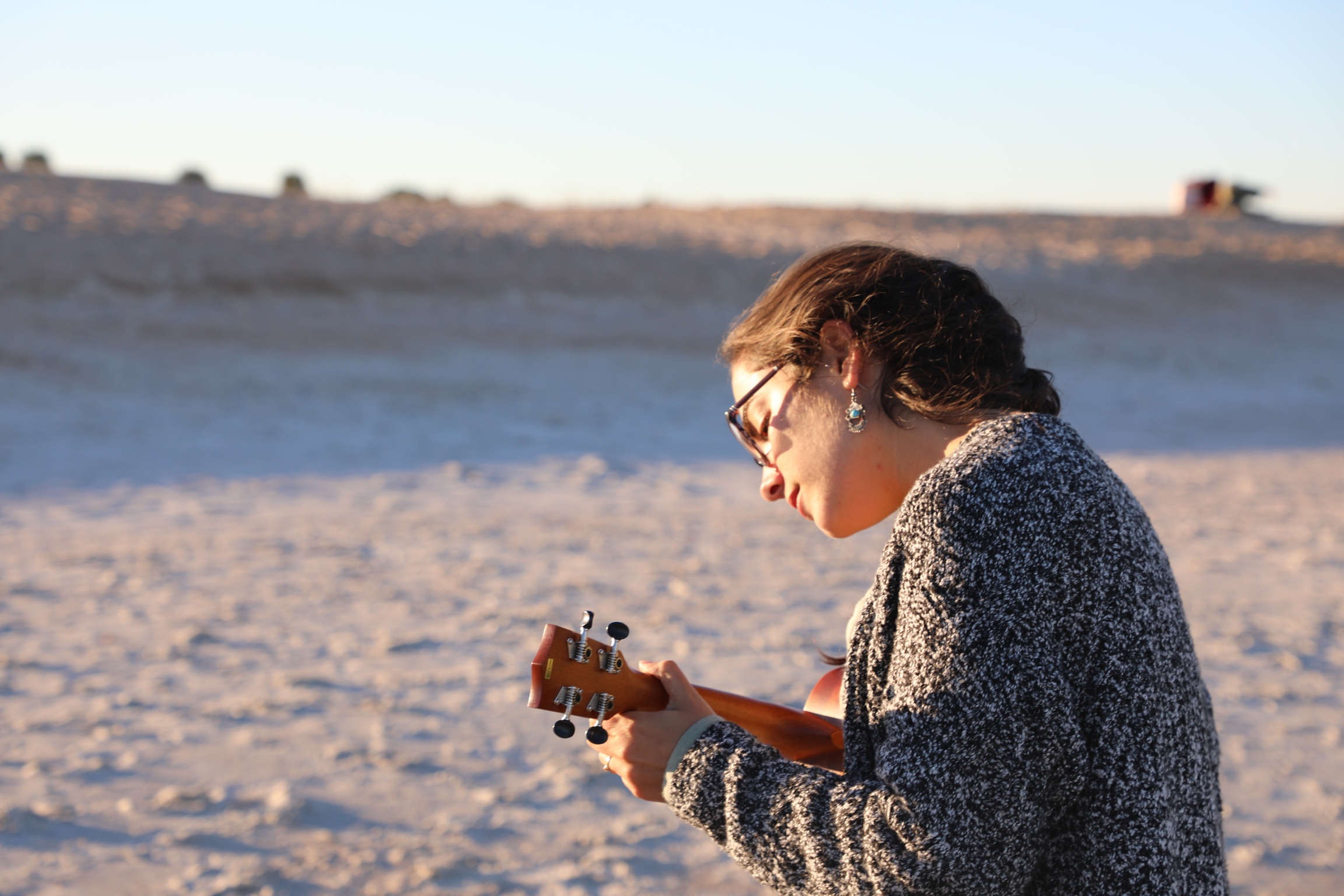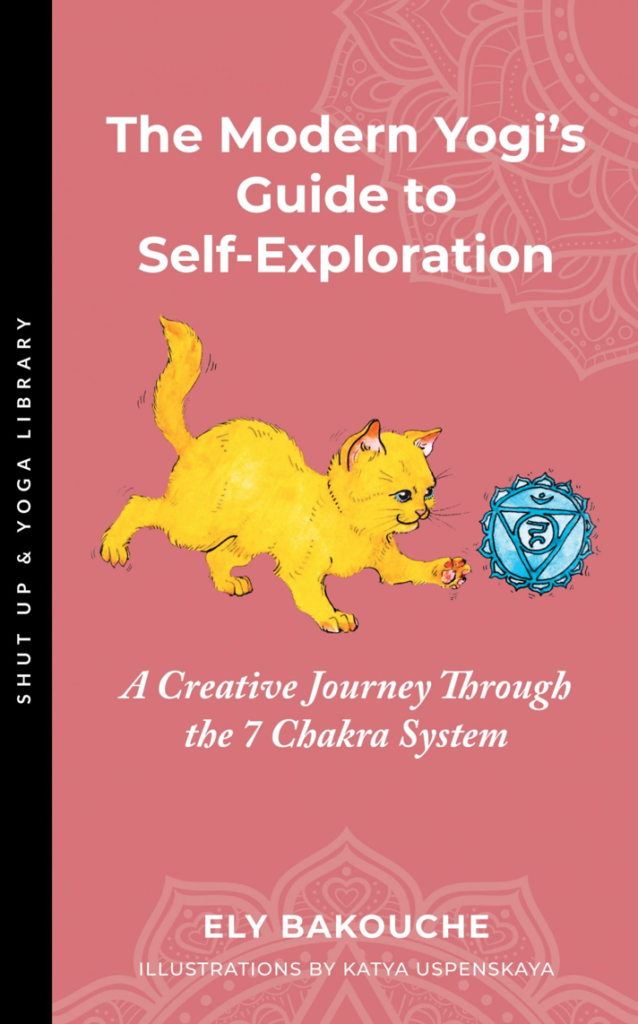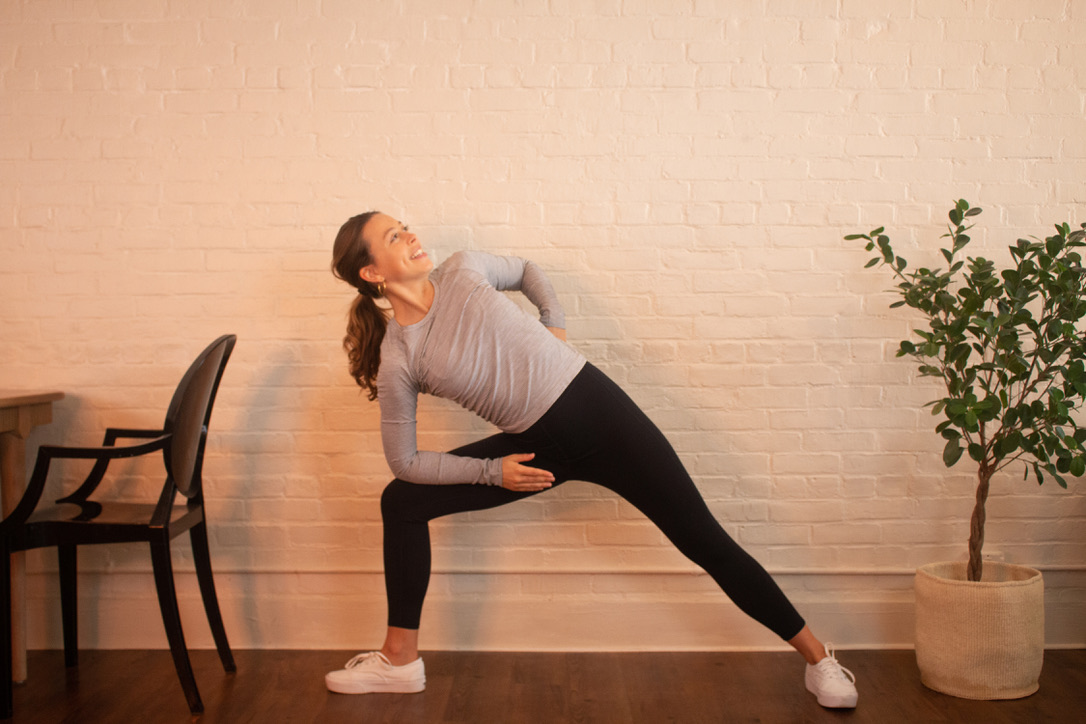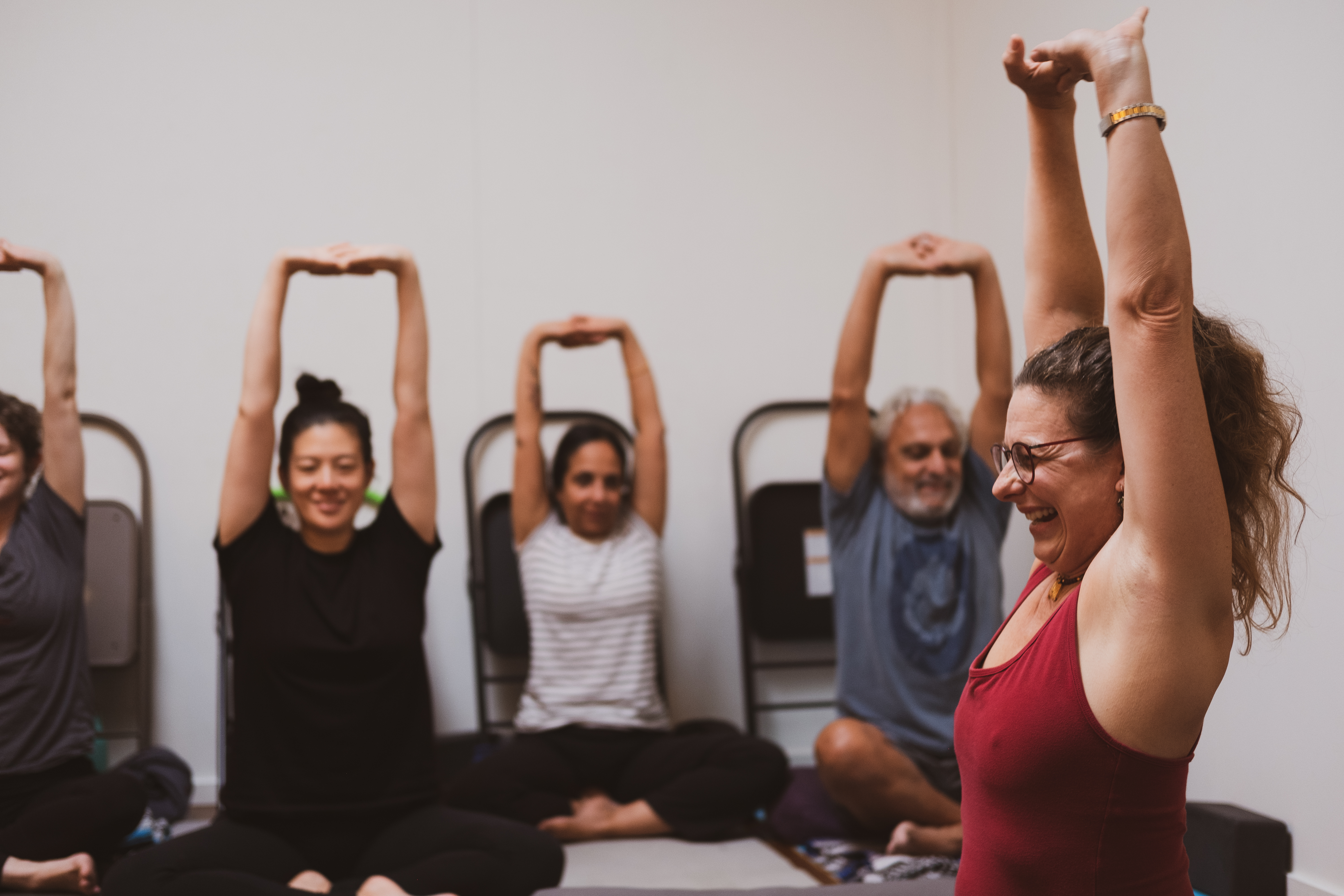We connected with Ely Bakouche several years ago through the platform she helped co found; Shut Up & Yoga. We continue to be super inspired by the approach and creativity of this digital magazine and love Ely’s perspective on yoga writing, travel, and life. Here, with catch up with Ely to learn more about her personal story and her latest book; The Modern Yogi’s Guide to Self Exploration.
Can you share a bit about your yoga background and your journey co-founding Shut Up & Yoga?
I started practicing yoga in 2011 when I was struggling with stress at university. I found Sarah Beth Yoga on YouTube and loved her gentle, grounding approach. I also loved that she advocated for a practice every day, using mindfulness principles to be present with your loved ones over dinner or even while making your bed in the morning. For me, yoga quickly became a way to build my inner bubble, to create a safe haven to return to when the world was a bit too much. I am very sensitive to sound, touch, light, activity around me—signs of a sensitive nervous system—, so practicing online and having agency over how to set up my own space has always been so helpful to cultivate my sense of safety and comfort.
I took my first teacher training in 2017, which was primarily focused on vinyasa and exploring how our personal life story had impacted the way we carried ourselves into the world. From then on, I decided to pair my love for writing with yoga, and in 2018 started freelancing as a content writer. I wrote for yoga platforms, management software, and other health-related products, and also… magazines!
Anastasia, the founder of Shut Up & Yoga magazine found me on Instagram, and after writing my first article, we hopped on a call and then already, she asked me if I’d want to write a book with the magazine. I was living in New York City at the time, and as we continued exchanging, I fell in love with her vision for the magazine and went to visit her in Toronto, her home. I asked to get involved, and that day I became the editorial director of the magazine. I loved setting the editorial calendar and planning our content, editing articles, interacting with writers. A year later, after making so many decisions together, she told me I really should consider calling myself co-founder.
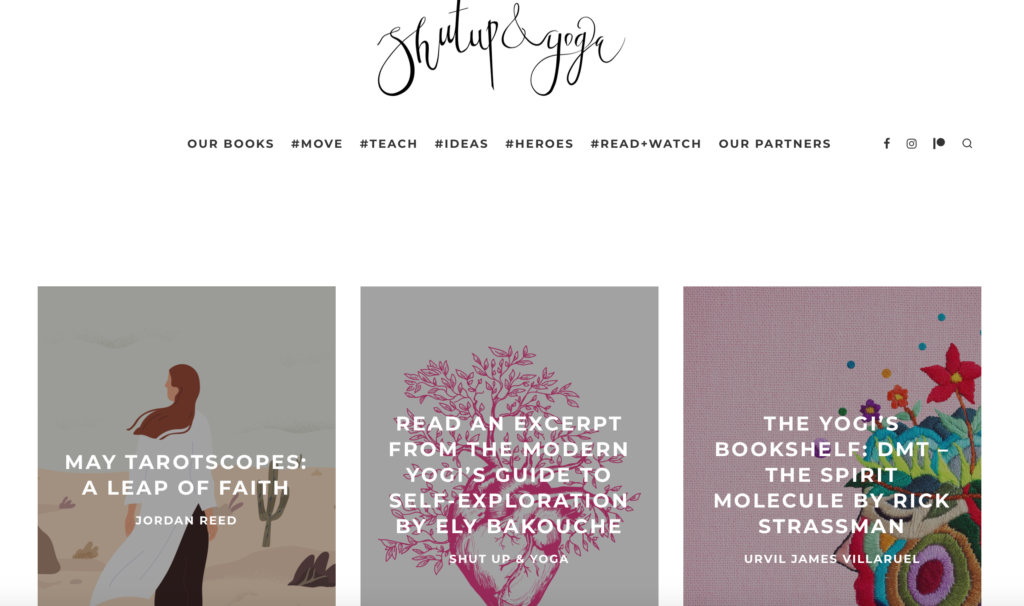
What do you love most about writing?
The chance to reflect and organize ideas. I love to start with a brain dump and look at how I understand a topic, getting a big picture idea of it. Then, I have so much fun diving deeper into my ideas, looking at how I can express what I feel, what I think, in the most accurate and most thought-provoking way possible.
Do you know this quote from Dead Poet Society, “No matter what people tell you, words and ideas can change the world”? That’s why I love writing. It can be such a powerful tool to encourage new thoughts, to start an inner revolution in readers’ minds. There are so many things to improve in our world, from human rights to environmental justice, writing for me is a way to invite people to think about their role as human beings on this planet and what they want to make out of their existence. How can we change the world for the better if we don’t know what we think about it, or how our hearts respond to it?
How does the creative process work for you? What helps spark your creative juices?
The more I learn about topics that interest me, and speak to people who have new perspectives on topics I’m not familiar with, the easier it is for me to write. I recently heard that there are 3 types of creatives: those who easily have new ideas, those who can focus on one idea and dive deep into it, and those who can apply ‘old’ ideas to new (or adjacent) areas—I would be the latter. I love to look at things from different angles, and to constantly question what I know.
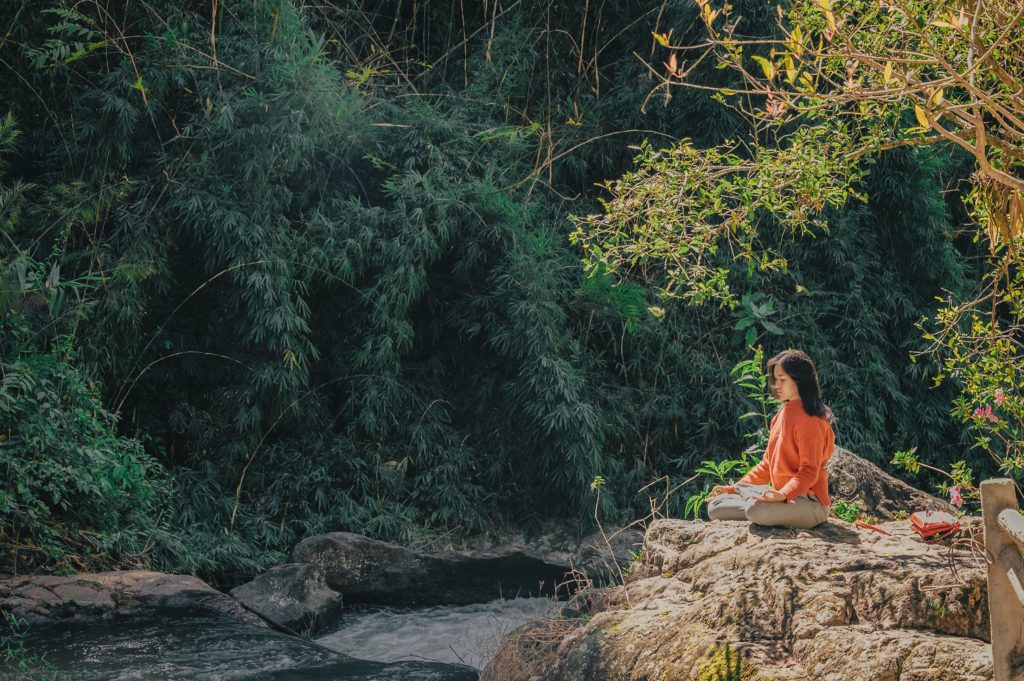
Rest also plays a huge part in my ability to create. My brain really benefits from a walk in the park or a nice long savasana when I’m stuck on something. It usually doesn’t take long for me to find my spark back if I step away from my work.
Last but not least, having an open mind is absolutely essential to keeping the creative spark alive. It’s not always comfortable to dive deep into my own ideas, but it’s absolutely worth it.
You recently wrote a book! Tell us about it!
That’s right! Interestingly enough, it was a journey to write it, and my goal with it is to encourage readers to embark on the journey of self-exploration with me. But it’s not just about spending time with yourself, but also asking how that self-knowledge can help you make better, kinder, more intentional choices in your day-to-day life, for yourself and your communities.
I used the chakra system as a framework to discuss our relationship with different areas of life, like our self-confidence, self-expression, or sense of safety. I tried to make it as accessible as possible, with practical exercises and things to try in each chapter, which was something I was really missing when trying to learn about the chakras. A lot of the knowledge we have in the West about the chakras is about essential oils and yoga sequences; I wanted to highlight how it can be a tool of us to dive deeper into our sense of self, relationship with the world, and spirituality.
In that way, it’s a book to take with you on a cozy morning or gentle evening. It’s meant to nourish your self-practice and inspire you to take action in your day-to-day life, and to invite you to think about how to extend your learning into your communities.
Although you are a world traveler, you have adopted the concept of ‘slow travel’. How do you define this, live this, and why do you believe it is important?
Where do I begin? There are so many reasons, both from a necessity and from a biological point of view, humans aren’t meant to go fast. Our nervous system loves us and wants to keep us safe, and constantly moving is an obstacle to our nervous system doing its job. Any digital nomad will tell you, somewhat ashamed as it’s so rarely talked in the DN world, that traveling is exhaustive. So many friends over the last year have shared that they miss traveling, but that they don’t miss the exhausting planning and ‘admin’ part of going from place to place every 3, 2, or even every single month. And that’s not even addressing the fact that it’s impossible to travel fast with your family, your friends, your most precious possessions. Nomads have always inhabited this planet, but they would do it on foot, and they’d take their home with them, not a 60 liter backpack.
From a planetary perspective, our earth is tired. It is tired of us overusing fossil fuels and traveling like there’s no tomorrow. The transportation industry accounts for 15% of greenhouse gas emissions, and that’s not even mentioning the polluants the aviation industry releases into the atmosphere with every flight.
From a cultural and traveler perspective, slow travel gives us so much more time to dive deeper into a culture we find ourselves in, to know the people who inhabit that part of the planet. I am writing this interview from Shanghai, China, and there’s no way I’d have gotten to know Chinese culture to the extent I have in almost two years living here if I’d taken one, two, or three months to discover this beautiful and fascinating country.

Slow travel is the future of travel, and I hope it becomes our new normal. Even its name is misleading—slow travel isn’t slow, it’s just more human-friendly, the current norm is fast travel. There are so many people already doing it—and I have yet to hear someone who regrets or would rather choose to travel
So many of us in the wellness and yoga world, love to travel and explore inside and out. What do you think the bigger purpose behind all of this is?;)
Oh, this is such a good question. I think anyone who calls themselves a yogi is inherently drawn to exploring deeper layers of the human experience. When we travel or when we chant, we get to connect to the big questions and the deeper meaning of life, and ask, what is my destiny in this life? How can I be better human for myself and for the people around me? How can I connect to others’ lived experiences and learn from them?
What do you get excited about when you wake up in the morning?
I just started reading “Blessed Unrest” by Paul Hawken, the creator of Project Drawdown, where he tries to pin down the civil society movement at the crossroads of social justice, environmental activism, and indigenous cultures’ resistance to globalization. It’s a movement with no name that doesn’t get much media attention, but it’s the people at the center of the defense of human rights and climate justice. It’s an antidote to the toxic news cycle and the uplifting read I need to continue to act and spread awareness about the climate crisis and social justice right now.
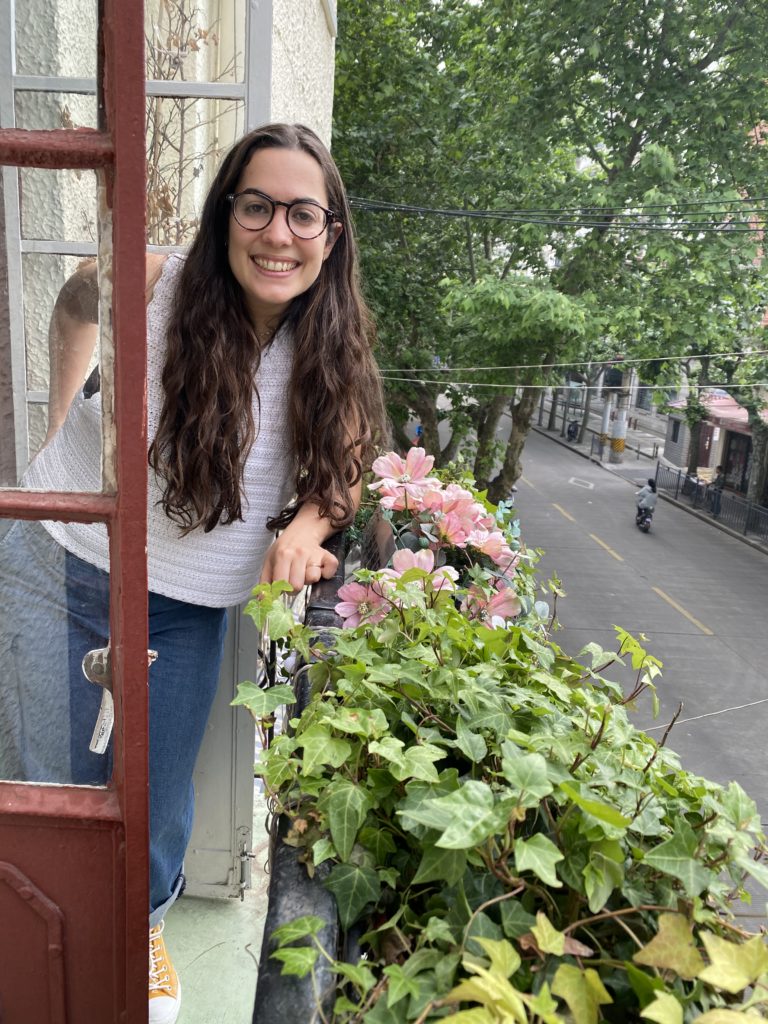
Anything else you would like to share?
Yes, please reach out to me to chat! The online world is such a fantastic tool to connect with like-minded people. We can create so much together, learn from each other, and simply remember that there are people behind IP addresses.
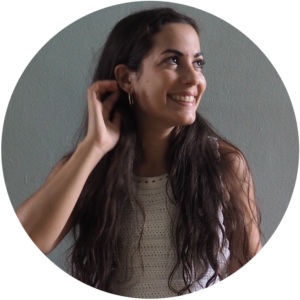 Ely is the co-founder and editorial director at Shut Up & Yoga magazine. She’s also a writer, yoga teacher, world traveler, life student, and absolute language nerd. She believes that, in a productivity-centered world, rest, questioning, and play are forms of resistance and ones she has made her mission to share with her communities. She currently lives in Shanghai, China.
Ely is the co-founder and editorial director at Shut Up & Yoga magazine. She’s also a writer, yoga teacher, world traveler, life student, and absolute language nerd. She believes that, in a productivity-centered world, rest, questioning, and play are forms of resistance and ones she has made her mission to share with her communities. She currently lives in Shanghai, China.
Read the book: https://shutupandyoga.com/chakra-book/
Connect on Instagram: https://www.instagram.com/ebsnotebook/
Sign up for my newsletter, the Restorative Bubble: https://landing.mailerlite.com/webforms/landing/r0o3i1
Blog: http://ebsnotebook.com/



